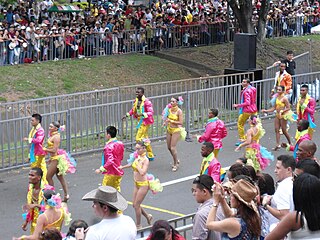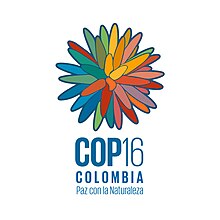
The Convention on Biological Diversity (CBD), known informally as the Biodiversity Convention, is a multilateral treaty. The Convention has three main goals: the conservation of biological diversity ; the sustainable use of its components; and the fair and equitable sharing of benefits arising from genetic resources. Its objective is to develop national strategies for the conservation and sustainable use of biological diversity, and it is often seen as the key document regarding sustainable development.
Rio Convention relates to the following three conventions, which were agreed at the Earth Summit held in Rio de Janeiro in June 1992.

A megadiverse country is one of a group of nations that harbours the majority of Earth's species and high numbers of endemic species. Conservation International identified 17 megadiverse countries in 1998. Many of them are located at least partially in tropical or subtropical regions.

The 1971 Pan American Games were held in Cali, Colombia, from July 30 to August 13, 1971. A total of 2,935 athletes from 32 countries participated in 17 sports.

Cali Fair is an cultural event held in Cali, Colombia from December 25 to December 30. It is a celebration of the region's cultural identity, famous for the Salsa marathon, horse riding parades and dance parties.
The World Wide Views projects were started in 2009 by the Danish Board of Technology Foundation to involve citizens in global environmental policy making through deliberation and voting.

Karen Christiana Figueres Olsen is a Costa Rican diplomat who has led national, international and multilateral policy negotiations. She was appointed Executive Secretary of the UN Framework Convention on Climate Change (UNFCCC) in July 2010, six months after the failed COP15 in Copenhagen. During the next six years she worked to rebuild the global climate change negotiating process, leading to the 2015 Paris Agreement, widely recognized as a historic achievement.

The World People's Conference on Climate Change and the Rights of Mother Earth was a global gathering of civil society and governments hosted by the government of Bolivia in Tiquipaya, just outside the city of Cochabamba on 19–22 April 2010.
The United Nations General Assembly had declared 2011–20 the United Nations Decade on Biodiversity. The UN Decade on Biodiversity had served to support and promote implementation of the Strategic Plan for Biodiversity and the Aichi Biodiversity Targets, with the goal of significantly reducing biodiversity loss. None of the 20 aichi targets were achieved, though progress was made towards several of them.
The Earth Negotiations Bulletin (ENB) is a reporting service providing daily coverage on a variety of global environmental and sustainable development negotiations.

The United Nations Climate Change Conferences are yearly conferences held in the framework of the United Nations Framework Convention on Climate Change (UNFCCC). They serve as the formal meeting of the UNFCCC parties – the Conference of the Parties (COP) – to assess progress in dealing with climate change, and beginning in the mid-1990s, to negotiate the Kyoto Protocol to establish legally binding obligations for developed countries to reduce their greenhouse gas emissions. Starting in 2005 the conferences have also served as the "Conference of the Parties Serving as the Meeting of Parties to the Kyoto Protocol" (CMP); also parties to the convention that are not parties to the protocol can participate in protocol-related meetings as observers. From 2011 to 2015 the meetings were used to negotiate the Paris Agreement as part of the Durban platform, which created a general path towards climate action. Any final text of a COP must be agreed by consensus.

A conference of the parties is the supreme governing body of an international convention. It is composed of representatives of the member states of the convention and accredited observers. Scope of the COP is to review the "implementation of the Convention and any other legal instruments that the COP adopts and take decisions necessary to promote the effective implementation of the Convention".

The biodiversity of Colombia is the variety of indigenous organisms in the country with the second-highest biodiversity in the world. As of 2021, around 63,000 species are registered in Colombia, of which 14% are endemic. The country occupies worldwide the first position in number of orchids, birds and butterflies, second position in plants, amphibians and fresh water fish, third place in species of palm trees and reptiles and globally holds the sixth position in biodiversity of mammals.

Brigitte Luis Guillermo Baptiste, is a Colombian cultural landscape ecologist and an expert on environmental issues and biodiversity in Colombia. She is a member of the Multidisciplinary Expert Panel of the Intergovernmental Science and Policy Platform on Biodiversity and Ecosystem Services and has been part of the national representation to the Inter-American Institute for Global Change Research. She served as director of the Alexander von Humboldt Biological Resources Research Institute from 2011 until 2019. In September 2019, Baptiste became the director of Universidad Ean. She considers that queerness and ecology are linked together.

30 by 30 is a worldwide initiative for governments to designate 30% of Earth's land and ocean area as protected areas by 2030. The target was proposed by a 2019 article in Science Advances, "A Global Deal for Nature: Guiding principles, milestones, and targets", highlighting the need for expanded nature conservation efforts to mitigate climate change. Launched by the High Ambition Coalition for Nature and People in 2020, more than 50 nations had agreed to the initiative by January 2021, which has increased to more than 100 countries by October 2022.
Digital sequence information (DSI) is a placeholder term used in international policy fora, particularly the Convention on Biological Diversity (CBD), to refer to data derived from de-materialized genetic resources. The 2018 Ad Hoc Technical Expert Group on DSI reached consensus that the term was "not appropriate". Nevertheless, the term is generally agreed to include nucleic acid sequence data, and may be construed to include other data types derived from or linked to dematerialized genetic resources, including, for example, protein sequence data. The appropriateness and meaning of this term remain controversial as evidenced by its continued placeholder status, post the 15th Conference of the Parties to the CBD. DSI is crucial to research in a wide range of contexts, including public health, medicine, biodiversity, plant and animal breeding, and evolution research.

The 2022 United Nations Biodiversity Conference of the Parties (COP15) to the UN Convention on Biological Diversity (CBD) was a conference held in Montreal, Canada, which led to the international agreement to protect 30% of land and oceans by 2030 and the adoption of the Kunming-Montreal Global Biodiversity Framework.
Other effective area-based conservation measures (OECMs) are sites outside of protected areas that are governed and managed in ways that deliver the long-term in situ conservation of biodiversity. As of March 2023, 829 such sites have been reported to the World Database on Other Effective Area-based Conservation Measures, managed by the UN Environment Programme World Conservation Monitoring Centre. OECMs cover 3,094,741 km2 (1,194,886 sq mi) of the Earth's surface, accounting for 2,716,531 km2 (1,048,858 sq mi) on land and 378,209 km2 (146,027 sq mi) in the ocean.

The Kunming-Montreal Global Biodiversity Framework (GBF) is an outcome of the 2022 United Nations Biodiversity Conference. Its tentative title had been the "Post-2020 Global Biodiversity Framework". The GBF was adopted by the 15th Conference of Parties (COP15) to the Convention on Biological Diversity (CBD) on 19 December 2022. It has been promoted as a "Paris Agreement for Nature". It is one of a handful of agreements under the auspices of the CBD, and it is the most significant to date. It has been hailed as a "huge, historic moment" and a "major win for our planet and for all of humanity."

The United Nations Biodiversity of Areas Beyond National Jurisdiction Treaty, also known as the High Seas Treaty or the BBNJ treaty, is a legally binding instrument for the conservation and sustainable use of marine biological diversity in areas beyond national jurisdiction. It is an agreement under the United Nations Convention on the Law of the Sea (UNCLOS). The text was finalised during an intergovernmental conference at the UN on 4 March 2023 and adopted on 19 June 2023. Both states and regional economic integration organizations can become parties to the treaty.














